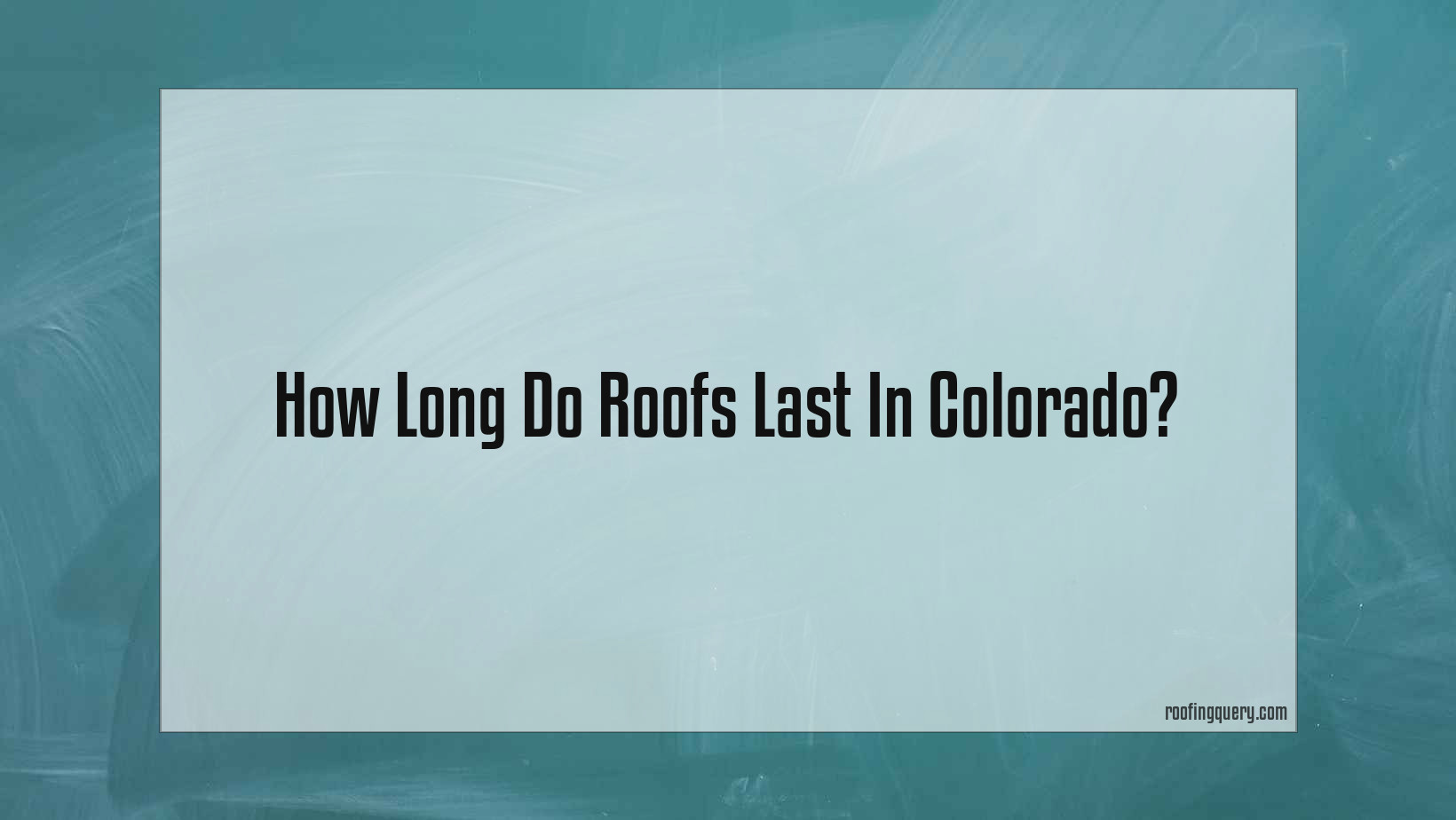The average roof lasts 20-25 years in Colorado.
The lifespan of a roof is determined by many factors, including the type of roofing materials, the quality of the installation, the climate, and the maintenance regime. In general, most types of roofs will last between 20 and 30 years in Colorado. However, some types of roofs, such as those made from metal or slate, can last much longer. Proper maintenance is the key to prolonging the life of any roof, so it is important to have your roof inspected regularly and to make repairs as soon as any problems are detected.
How Long Does The Average Roof Last In Colorado?
The average roof lasts around 20-25 years in Colorado.

When it comes to the average roof lifespan, most roofs in Colorado should last anywhere from 15 to 30 years. This obviously depends on a number of factors, such as the quality of materials used, the roof’s ventilation, the slope of the roof, and the amount of tree coverage surrounding the home.
For example, a roof made with high-quality materials that has good ventilation and a moderate slope is likely to last on the higher end of the lifespan spectrum. Conversely, a roof made with lower-quality materials that has poor ventilation and a steep slope is likely to last on the lower end of the lifespan spectrum.
It’s also important to note that the average lifespan of a roof can be shortened by extreme weather conditions. For instance, if a Colorado home experiences a lot of hailstorms, the lifespan of the roof will be reduced because the hailstones can damage the shingles.
All in all, the average roof in Colorado should last between 15 and 30 years. But, as with anything, there are always exceptions to the rule.
How Often Should Roofs In Colorado Be Replaced?
It is typically recommended that roofs in Colorado be replaced every 15-20 years.
How often should roofs in Colorado be replaced?
This is a difficult question to answer because it depends on many factors, such as the type of roof, the climate, and the amount of wear and tear it experiences. In general, however, most roofs will last between 20 and 30 years.
If you live in Colorado, you know that our state experiences a wide range of weather conditions, from blistering hot summers to frigid winters. This extreme temperature swings can take a toll on your roof, causing it to deteriorate faster than in other parts of the country.
Another factor to consider is the type of roof you have. For instance, asphalt shingles are a popular choice in Colorado, but they don’t typically last as long as tile or metal roofs. If you have an asphalt roof, you may need to replace it sooner than you would if you had a different type of roof.
If you’re not sure how often you should replace your roof, it’s a good idea to consult with a professional roofer. They can inspect your roof and give you an estimate of how long it will last. They can also recommend the best time to replace your roof, based on the current condition of your home and the weather forecast.
To sum it up, there is no definitive answer to how often roofs in Colorado should be replaced. It depends on a variety of factors, including the type of roof, the climate, and the amount of wear and tear it experiences. If you’re unsure, it’s best to consult with a professional roofer to get an expert opinion.
What Are The Most Common Roofing Problems In Colorado?
The most common roofing problems in Colorado are leaks and ice dams.
What are the most common roofing problems in Colorado?
While it’s true that Colorado’s climate is ideal for growing a lush, green lawn, the state’s semi-arid climate and large temperature swings can take a toll on roofs. Here are four of the most common roofing problems faced by Colorado homeowners, along with some tips on how to prevent or fix them.
1. UV Damage
Colorado’s high altitude and sunny days make it a prime location for UV damage to occur. UV rays can cause shingles to become brittle and crack, and can also fade the color of your roof. To prevent UV damage, make sure to choose a shingle that is rated for high UV exposure and have your roof inspected regularly for signs of damage.
2. Wind Damage
Strong winds are a common occurrence in Colorado, and they can cause serious damage to your roof. High winds can lift shingles and cause them to blow off, leaving your roof vulnerable to water damage. To prevent wind damage, make sure your shingles are properly nailed down and have your roof inspected after any severe storms.
3. Hail Damage
Hail is another common weather hazard in Colorado. Hailstones can crack or break shingles, and can also cause dents in metal roofing. To prevent hail damage, have your roof inspected regularly for signs of damage and make sure to repair any damage as soon as possible.
4. Snow and Ice Damage
Colorado is known for its winter snowstorms, and while the snow may be beautiful, it can wreak havoc on your roof. Heavy snow can cause shingles to collapse, and ice dams can form, leading to water damage. To prevent snow and ice damage, make sure your roof is properly insulated and ventilated and have your gutters cleaned regularly.
If you’re a Colorado homeowner, it’s important to be aware of the common roofing problems in your state. By taking some simple precautions, you can help prevent damage to your roof and keep your home in top condition.
What Are The Best Roofing Materials For Colorado?
The best roofing materials for Colorado are asphalt shingles.
There are a few things to consider when choosing the best roofing materials for Colorado. The first is the climate. Colorado can have some very extreme weather conditions, with large temperature swings and high winds. This can put a lot of stress on a roof, so it’s important to choose materials that can withstand the elements.
The second consideration is the style of your home. If you have a traditional Colorado home, you might want to stick with classic materials like wood or slate. If you have a more modern home, there are a variety of synthetic materials that can give you the look you want while still being durable.
Finally, you need to think about your budget. There are roofing materials to fit every budget, so it’s important to find one that works for you.
Here are a few of the best roofing materials for Colorado:
Asphalt shingles: Asphalt shingles are a popular choice for Colorado roofs because they’re durable and relatively affordable. They come in a variety of colors and styles, so you can find a look that fits your home.
Metal roofing: Metal roofing is a great option for Colorado homes because it can withstand high winds and heavy snow. It’s also energy-efficient, so it can help keep your home cool in the summer.
Slate: Slate is a classic roofing material that has been used for centuries. It’s durable and stylish, and it can add a touch of elegance to any home.
Wood: Wood roofing is a beautiful option for Colorado homes. It adds a natural look to your home and can be stained or painted to match your décor.
Synthetic: Synthetic roofing materials are a good choice for Colorado homes because they’re durable and low-maintenance. They come in a variety of colors and styles, so you can find a look that fits your home.
No matter what roofing material you choose, it’s important to make sure it’s installed properly. A professional roofer will know how to properly install your roof to ensure it lasts for years to come.
FAQ
How Can I Extend The Life Of My Roof In Colorado?
What Are The Signs That My Roof Needs To Be Replaced In Colorado?
1. Your roof is over 20 years old: The average lifespan of a roof is 20-25 years. If your roof is approaching or has exceeded this age, it may be time to start thinking about a replacement.
2. You’re seeing signs of wear and tear: This can include things like missing or damaged shingles, leaks, or structural damage.
3. Your energy bills are increasing: If your roof is not properly insulated, you may be seeing a spike in your energy bills. This is because your HVAC system is working overtime to try and keep your home at a comfortable temperature.
4. You notice strange noises: If you start to hear creaking, popping, or other strange noises coming from your roof, this could be a sign of structural damage.
If you’re noticing any of these signs, it’s important to consult with a professional roofer to assess the situation. They will be able to tell you for sure whether or not you need a new roof and can provide you with a estimate for the cost of replacement.
How Much Does It Cost To Replace A Roof In Colorado?
How Do I Know If My Roofer Is Reputable In Colorado?
-Check with the Better Business Bureau to see if there have been any complaints filed against the company.
-Ask the roofer for references from past clients in Colorado.
-Read online reviews of the roofer’s work.
I hope this answers your question about roof lifespan in Colorado. If you have any other questions, please let me know in the comments section below.

